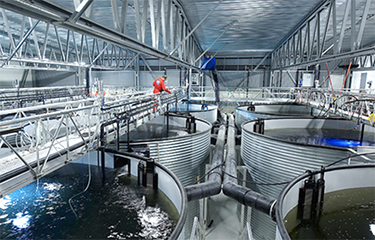Dublin, Ireland-based aquaculture technology company NanobOx has received a new round of funding to help it bring its innovative oxygenation technology to market and kickstart the country’s stagnant domestic aquaculture sector.
The fresh round of funding comes after the company already secured Series A funding of EUR 900,000 (USD 972,000) from a consortium of venture capital investors who have bought into NanobOx’s energy-efficient method of oxygenating aquaculture ponds. Specifically, NanobOx uses a low-voltage electric field to generate nanobubbles fed directly into a farm's water. The technology is currently undergoing trials at two Irish sites.
“Initial results show a 90 percent reduction in oxygenation energy costs compared to [traditional] diffusion aeration systems,” NanobOx CEO John Favier said.
Another benefit of NanobOx technology is that nanobubbles are less intrusive to larvae, potentially increasing survival rates in addition to lowering costs, Favier said.
Initially focused on salmon, trout, and mollusk farming, NanobOx has expanded its ambitions and aims to develop technology solutions for pond and raceway shrimp producers as well.
Aquatech innovations like NanobOx technology epitomize the potential of Irish innovation, but domestic aquaculture output remains largely stagnant, aligning with trends across the E.U. where aquaculture output across the bloc decreased in 2022 by volume.
Despite the availability of public funding, very few new aquaculture farms popped up in the E.U. between 2014 and 2020, according to a recent statement from the Federation of European Aquaculture Producers. The organization blamed “excessive administrative burden caused by overzealous implementation of environmental regulations, an unlevel playing field [in regard to] imports, and confusing information [disseminated] to consumers.”
For the Irish aquaculture sector in particular, licensing challenges – prompted by the E.U. reprimanding the Irish government over its management of the process – have been a particular bane for farmers looking to start ventures.
Aquatech innovations do not always translate to aquaculture output, according to Teresa Morrisey, the head of aquaculture policy at the Irish Farmers Association.
“There is a lot of movement in the aquatech space … but if you want to investigate the validity of this space, you need to have fish in the water,” Morrisey said. “There has been a view that we can develop aquaculture technology independently of aquaculture production. Sometimes, the two may be overseparated.”
To reverse these trends, governmental bodies have instituted measures …








